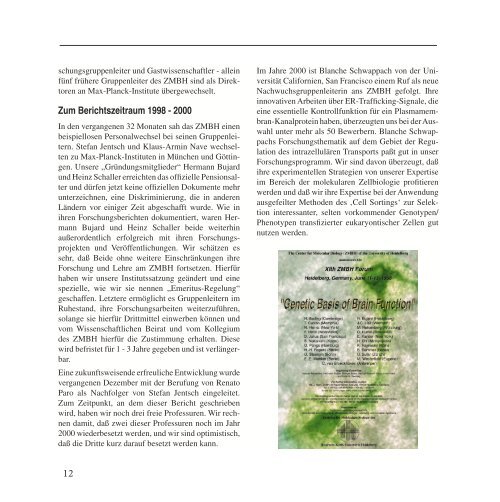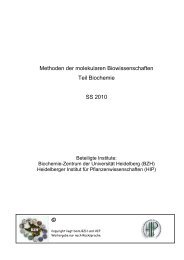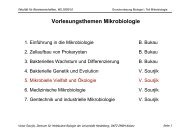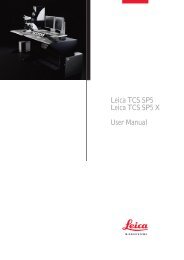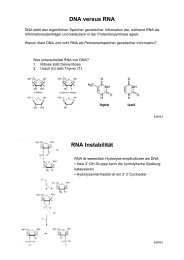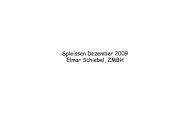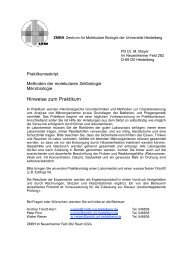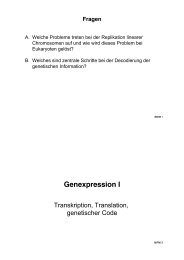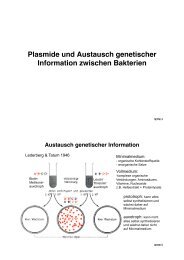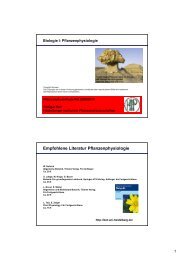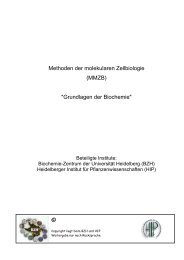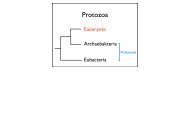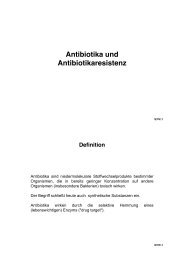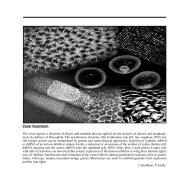ZMBH J.Bericht 2000 - Zentrum für Molekulare Biologie der ...
ZMBH J.Bericht 2000 - Zentrum für Molekulare Biologie der ...
ZMBH J.Bericht 2000 - Zentrum für Molekulare Biologie der ...
Create successful ePaper yourself
Turn your PDF publications into a flip-book with our unique Google optimized e-Paper software.
schungsgruppenleiter und Gastwissenschaftler - allein<br />
fünf frühere Gruppenleiter des <strong>ZMBH</strong> sind als Direktoren<br />
an Max-Planck-Institute übergewechselt.<br />
Zum <strong>Bericht</strong>szeitraum 1998 - <strong>2000</strong><br />
In den vergangenen 32 Monaten sah das <strong>ZMBH</strong> einen<br />
beispiellosen Personalwechsel bei seinen Gruppenleitern.<br />
Stefan Jentsch und Klaus-Armin Nave wechselten<br />
zu Max-Planck-Instituten in München und Göttingen.<br />
Unsere „Gründungsmitglie<strong>der</strong>“ Hermann Bujard<br />
und Heinz Schaller erreichten das offizielle Pensionsalter<br />
und dürfen jetzt keine offiziellen Dokumente mehr<br />
unterzeichnen, eine Diskriminierung, die in an<strong>der</strong>en<br />
Län<strong>der</strong>n vor einiger Zeit abgeschafft wurde. Wie in<br />
ihren Forschungsberichten dokumentiert, waren Hermann<br />
Bujard und Heinz Schaller beide weiterhin<br />
außerordentlich erfolgreich mit ihren Forschungsprojekten<br />
und Veröffentlichungen. Wir schätzen es<br />
sehr, daß Beide ohne weitere Einschränkungen ihre<br />
Forschung und Lehre am <strong>ZMBH</strong> fortsetzen. Hier<strong>für</strong><br />
haben wir unsere Institutssatzung geän<strong>der</strong>t und eine<br />
spezielle, wie wir sie nennen „Emeritus-Regelung“<br />
geschaffen. Letztere ermöglicht es Gruppenleitern im<br />
Ruhestand, ihre Forschungsarbeiten weiterzuführen,<br />
solange sie hier<strong>für</strong> Drittmittel einwerben können und<br />
vom Wissenschaftlichen Beirat und vom Kollegium<br />
des <strong>ZMBH</strong> hier<strong>für</strong> die Zustimmung erhalten. Diese<br />
wird befristet <strong>für</strong> 1 - 3 Jahre gegeben und ist verlängerbar.<br />
Eine zukunftsweisende erfreuliche Entwicklung wurde<br />
vergangenen Dezember mit <strong>der</strong> Berufung von Renato<br />
Paro als Nachfolger von Stefan Jentsch eingeleitet.<br />
Zum Zeitpunkt, an dem dieser <strong>Bericht</strong> geschrieben<br />
wird, haben wir noch drei freie Professuren. Wir rechnen<br />
damit, daß zwei dieser Professuren noch im Jahr<br />
<strong>2000</strong> wie<strong>der</strong>besetzt werden, und wir sind optimistisch,<br />
daß die Dritte kurz darauf besetzt werden kann.<br />
12<br />
Im Jahre <strong>2000</strong> ist Blanche Schwappach von <strong>der</strong> Universität<br />
Californien, San Francisco einem Ruf als neue<br />
Nachwuchsgruppenleiterin ans <strong>ZMBH</strong> gefolgt. Ihre<br />
innovativen Arbeiten über ER-Trafficking-Signale, die<br />
eine essentielle Kontrollfunktion <strong>für</strong> ein Plasmamembran-Kanalprotein<br />
haben, überzeugten uns bei <strong>der</strong> Auswahl<br />
unter mehr als 50 Bewerbern. Blanche Schwappachs<br />
Forschungsthematik auf dem Gebiet <strong>der</strong> Regulation<br />
des intrazellulären Transports paßt gut in unser<br />
Forschungsprogramm. Wir sind davon überzeugt, daß<br />
ihre experimentellen Strategien von unserer Expertise<br />
im Bereich <strong>der</strong> molekularen Zellbiologie profitieren<br />
werden und daß wir ihre Expertise bei <strong>der</strong> Anwendung<br />
ausgefeilter Methoden des ‚Cell Sortings‘ zur Selektion<br />
interessanter, selten vorkommen<strong>der</strong> Genotypen/<br />
Phenotypen transfizierter eukaryontischer Zellen gut<br />
nutzen werden.<br />
appointed as successor of Stefan Jentsch last December.<br />
At the time of writing, we have three open tenure<br />
positions. We expect two of the three positions to be<br />
filled during <strong>2000</strong> and we are optimistic that the third<br />
professorship will follow soon after.<br />
In July <strong>2000</strong>, we hired Blanche Schwappach from the<br />
University of California, San Francisco as a new junior<br />
group lea<strong>der</strong>. Her innovative studies of ER trafficking<br />
signals serving an essential quality control function<br />
for a plasma membrane channel protein made us select<br />
her from over 50 applicants. Blanche Schwappach’s<br />
research focus on the regulation of intracellular transport<br />
mechanism fits well into our research program.<br />
We are confident that her experimental strategies will<br />
benefit from our expertise in molecular cell biology,<br />
and that we will benefit from her expertise in using<br />
sophisticated cell sorting for the selection of interesting<br />
rare genotypes/phenotypes of transfected eukaryotic<br />
cells.<br />
Due to their outstanding achievements in research and<br />
teaching, Gerd Multhaup and Percy Knolle were promoted<br />
to “project group lea<strong>der</strong>”. The host for both<br />
is currently the director. The status of “project group<br />
lea<strong>der</strong>” at the <strong>ZMBH</strong> as anchored to our bylaws,<br />
allowing the <strong>ZMBH</strong> to advance successful young scientists<br />
to formal independence, when justified by their<br />
achievements. Further requirements are independent<br />
research, grant support, the German “habilitation” and<br />
formal approval by the <strong>ZMBH</strong>‘s faculty. The appointed<br />
project group lea<strong>der</strong> receives lab space and financial<br />
support from our state budget but stays associated with<br />
one of the permanent groups for organizational purposes.<br />
Consi<strong>der</strong>able financial investments have again been<br />
allocated to our infrastructure. We are proud of the<br />
achievements of our transgenic unit un<strong>der</strong> its experienced<br />
and skilled head Juergen Weiss. The remarkable<br />
success of Frank Zimmermann and Domenico Basta to<br />
produce transgenic foun<strong>der</strong>s is acknowledged not only<br />
in the <strong>ZMBH</strong>. The latest addition to the animal facility<br />
is the service for transgenic flies that was installed<br />
to meet the increasing demands of several groups. The<br />
biomedical chemistry unit received a new Q-TOF mass<br />
spectrometer suited for proteomics from the Deutsche<br />
Forschungsgemeinschaft. We are indebted to Richard<br />
Herrmann for acting as interim head of this unit<br />
after Rainer Frank‘s departure. Thomas Ruppert will<br />
become the new head effective October <strong>2000</strong>. He is<br />
experienced in proteomics and worked previously at<br />
the Institute for Biochemistry, Charité, Berlin. The<br />
unit for high-resolution microscopy is currently being<br />
set up on the third floor with the assistance of Axel<br />
Baumm. It will be moved to laboratories on the first<br />
floor, currently being used as the director‘s office as<br />
13


